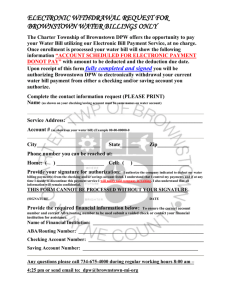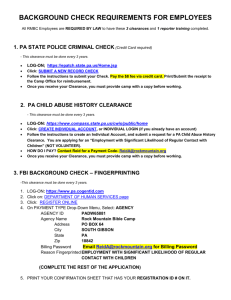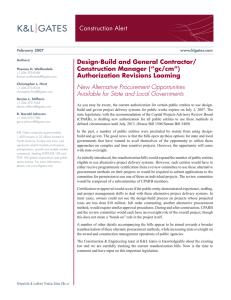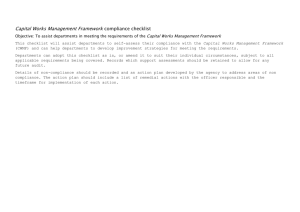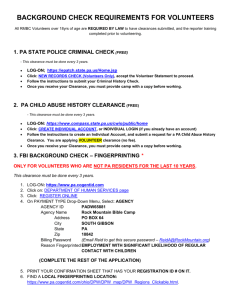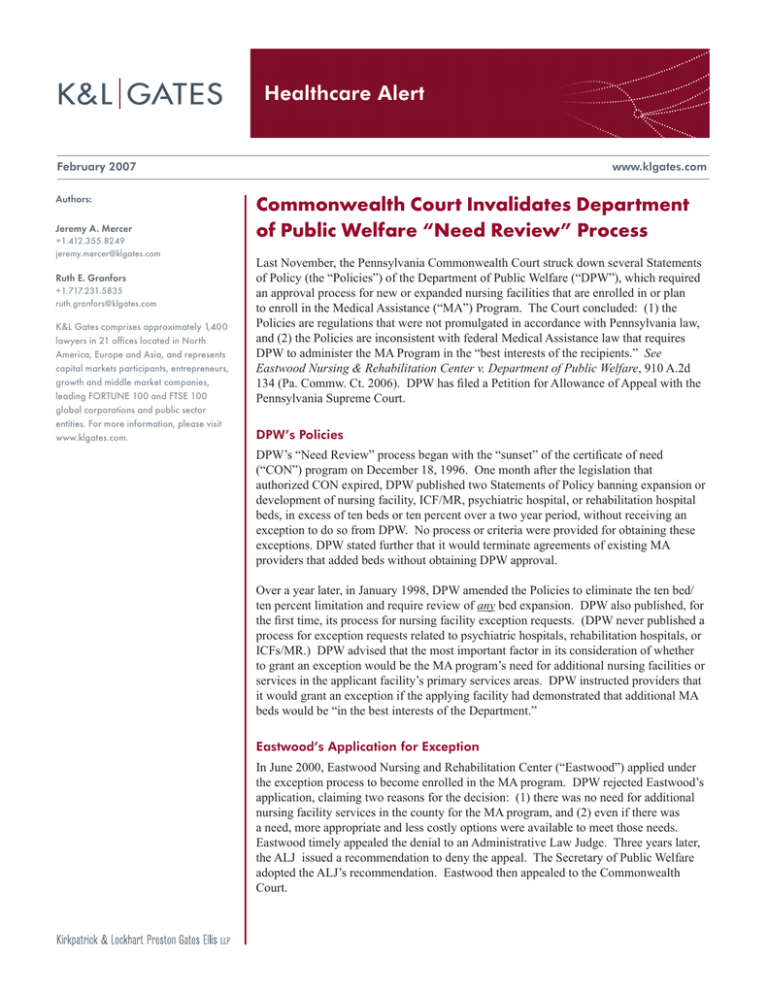
Healthcare Alert
February 2007
Authors:
Jeremy A. Mercer
+1.412.355.8249
jeremy.mercer@klgates.com
Ruth E. Granfors
+1.717.231.5835
ruth.granfors@klgates.com
K&L Gates comprises approximately 1,400
lawyers in 21 offices located in North
America, Europe and Asia, and represents
capital markets participants, entrepreneurs,
growth and middle market companies,
leading FORTUNE 100 and FTSE 100
global corporations and public sector
entities. For more information, please visit
www.klgates.com.
www.klgates.com
Commonwealth Court Invalidates Department
of Public Welfare “Need Review” Process
Last November, the Pennsylvania Commonwealth Court struck down several Statements
of Policy (the “Policies”) of the Department of Public Welfare (“DPW”), which required
an approval process for new or expanded nursing facilities that are enrolled in or plan
to enroll in the Medical Assistance (“MA”) Program. The Court concluded: (1) the
Policies are regulations that were not promulgated in accordance with Pennsylvania law,
and (2) the Policies are inconsistent with federal Medical Assistance law that requires
DPW to administer the MA Program in the “best interests of the recipients.” See
Eastwood Nursing & Rehabilitation Center v. Department of Public Welfare, 910 A.2d
134 (Pa. Commw. Ct. 2006). DPW has filed a Petition for Allowance of Appeal with the
Pennsylvania Supreme Court.
DPW’s Policies
DPW’s “Need Review” process began with the “sunset” of the certificate of need
(“CON”) program on December 18, 1996. One month after the legislation that
authorized CON expired, DPW published two Statements of Policy banning expansion or
development of nursing facility, ICF/MR, psychiatric hospital, or rehabilitation hospital
beds, in excess of ten beds or ten percent over a two year period, without receiving an
exception to do so from DPW. No process or criteria were provided for obtaining these
exceptions. DPW stated further that it would terminate agreements of existing MA
providers that added beds without obtaining DPW approval.
Over a year later, in January 1998, DPW amended the Policies to eliminate the ten bed/
ten percent limitation and require review of any bed expansion. DPW also published, for
the first time, its process for nursing facility exception requests. (DPW never published a
process for exception requests related to psychiatric hospitals, rehabilitation hospitals, or
ICFs/MR.) DPW advised that the most important factor in its consideration of whether
to grant an exception would be the MA program’s need for additional nursing facilities or
services in the applicant facility’s primary services areas. DPW instructed providers that
it would grant an exception if the applying facility had demonstrated that additional MA
beds would be “in the best interests of the Department.”
Eastwood’s Application for Exception
In June 2000, Eastwood Nursing and Rehabilitation Center (“Eastwood”) applied under
the exception process to become enrolled in the MA program. DPW rejected Eastwood’s
application, claiming two reasons for the decision: (1) there was no need for additional
nursing facility services in the county for the MA program, and (2) even if there was
a need, more appropriate and less costly options were available to meet those needs.
Eastwood timely appealed the denial to an Administrative Law Judge. Three years later,
the ALJ issued a recommendation to deny the appeal. The Secretary of Public Welfare
adopted the ALJ’s recommendation. Eastwood then appealed to the Commonwealth
Court.
Healthcare Alert
The Commonwealth Court found the Policies were
not properly promulgated as regulations, but were
applied as “binding norms” for providers and DPW.
Thus, the Policies were illegal in that they were
applied like regulations, but had not been developed
and published in accordance with the Regulatory
Review Act and the Commonwealth Documents
Law. In addition, the Court rejected DPW’s
argument that in promulgating the Polices, it acted
in accordance with federal law to assure that “MA
payments are consistent with efficiency, economy
and quality of services.” The Court reasoned that
DPW’s duty to administer the MA program under
federal law must consider the best interests of the
recipients, not the best interests of DPW.
Impact of the Commonwealth
Court’s Decision
DPW filed a Petition for Allowance of Appeal with
the Pennsylvania Supreme Court. As of the date
of this Alert, the Pennsylvania Supreme Court has
not made a decision as to whether it will accept the
appeal. While the Supreme Court is considering
DPW’s Petition, the impact of the Commonwealth
Court’s decision on other pending applications for
exception and new applications is under debate.
DPW is relying on a rule of procedure which
gives a Commonwealth agency an automatic stay
of an Order that is under appeal. However, the
question is whether that stay is of the Order only
and therefore applicable only to Eastwood, or a stay
of the Court’s reasoning and opinion and therefore
applicable to any interested party. In the meantime,
DPW is working on developing new Statements of
Policy to replace the ones invalidated by the Court,
which allegedly will address the concerns of the
Commonwealth Court and receive greater support
among the regulated providers. In addition, the
Governor’s health care reform proposals include
a suggestion that some form of certificate of need
program, under a different label, is in the works.
Whether a new “Need Review” program or some
revised review by DPW is ultimately employed in
this area of facility development remains to be seen.
We recommend that providers (including ICFs/MR,
psychiatric hospitals, and rehabilitation hospitals, in
addition to nursing facilities) become familiar with
these developments when considering expansion of
beds or construction of a new facility. Appropriate
contact with DPW and consultation with a lawyer
should be prerequisites to filing any application for
exception under DPW’s Policies. Depending on
the timing and substance of the Supreme Court’s
decision, the implementation of “new” Statements
of Policy by DPW, and the potential legislative
revival of a “Need Review” process, the landscape
for development of these services is certainly subject
to change within the year. We are watching DPW’s
appeal, DPW’s work on new Statements of Policy,
and the Governor’s initiatives and intend to issue a
further Alert once a change or clarification becomes
apparent.
To learn more about K&L Gates’ Health Care
Practice in Pennsylvania, please contact one of the
individuals listed below
Harrisburg Office
Ruth E. Granfors
717.231.5835
ruth.granfors@klgates.com
Patricia C. Shea
717.231.5870
patricia.shea@klgates.com
Pittsburgh Office
Edward V. Weisgerber
412.355.8980
ed.weisgerber@klgates.com
Stephanie D. Wall
412.355.8364
stephanie.wall@klgates.com
February 2007 | Healthcare Alert
K&L Gates comprises multiple affiliated partnerships: a limited liability partnership with the full name Kirkpatrick & Lockhart Preston Gates Ellis LLP qualified in
Delaware and maintaining offices throughout the U.S., in Berlin, and in Beijing (Kirkpatrick & Lockhart Preston Gates Ellis LLP Beijing Representative Office); a
limited liability partnership (also named Kirkpatrick & Lockhart Preston Gates Ellis LLP) incorporated in England and maintaining our London office; a Taiwan
general partnership (Kirkpatrick & Lockhart Preston Gates Ellis) which practices from our Taipei office; and a Hong Kong general partnership (Kirkpatrick &
Lockhart Preston Gates Ellis, Solicitors) which practices from our Hong Kong office. K&L Gates maintains appropriate registrations in the jurisdictions in which
its offices are located. A list of the partners in each entity is available for inspection at any K&L Gates office.
This publication/newsletter is for informational purposes and does not contain or convey legal advice. The information herein should not be used or relied
upon in regard to any particular facts or circumstances without first consulting a lawyer.
Data Protection Act 1998—We may contact you from time to time with information on Kirkpatrick & Lockhart Preston Gates Ellis LLP seminars and with our
regular newsletters, which may be of interest to you. We will not provide your details to any third parties. Please e-mail london@klgates.com if you would prefer
not to receive this information.
©1996-2007 Kirkpatrick & Lockhart Preston Gates Ellis LLP. All Rights Reserved.
February 2007 |

